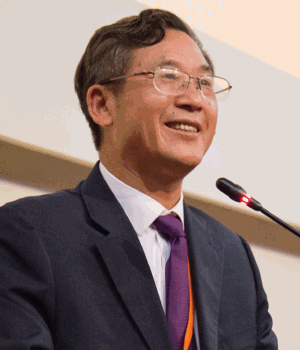
This is Part I of the special issue dedicated to the 60th birthday of Professor Ya-xiang Yuan with our deepest gratitude and sincerest friendship. Part II will appear later in the same volume of Optimization Methods and Software.
Professor Yuan received his bachelor's degree in 1981 from Xiangtan University in Hunan Province of China – a well-known university which has trained quite a few distinguished mathematicians. In March 1982, he was enrolled by the Computing Centre of Chinese Academy of Sciences as a graduate student of the late Professor Kang Feng who was one of the founders of the finite element method. One year later, he went to the University of Cambridge at the recommendation of Professor Feng. There, he started his graduate study under the supervision of the late Professor Michael James David Powell, who was a pioneer of numerical analysis and optimization. In 1985, Professor Yuan was awarded the Leslie Fox Prize in numerical analysis. He received his PhD degree from the University of Cambridge in 1986 and worked in the same university as a Rutherford research fellow at Fitzwilliam College before returning to China in September 1988.
Professor Yuan works in the broad area of mathematical optimization and its applications. He has made outstanding contributions in the topics of trust-region methods, quasi-Newton methods, nonlinear conjugate gradient methods and subspace optimization methods. His development and analysis of trust-region methods are fundamental. He proved optimality conditions for the Celis-Dennis-Tapia subproblem and proved the ‘1/2’ conjecture of the Steihaug-Toint truncated conjugate gradient method for solving standard trust-region subproblems. His joint work with Professor Richard Byrd and Professor Jorge Nocedal on the global convergence for a class of quasi-Newton methods is one of the most important achievements of nonlinear programming theory in the 1980s. The ‘Dai-Yuan method’, proposed by him jointly with Professor Yu-Hong Dai, is one of the four major nonlinear conjugate gradient methods. His book Optimization Theory and Methods: Nonlinear Programming, jointly with Professor Wenyu Sun, is a must-read textbook for Chinese students and scholars.
Professor Yuan is currently the President of the International Council for Industrial and Applied Mathematics (ICIAM) and is the President of the Chinese Mathematical Society. He also serves as Editor-in-Chief of Science China Mathematics and of Journal of the Operations Research Society of China. He was an invited speaker at ICIAM 1999 and at the International Congress of Mathematicians (ICM) 2014. He was elected to be an academician of the Chinese Academy of Sciences in 2011. He is a corresponding member of the Brazilian Academy of Sciences and a fellow of the World Academy of Sciences (TWAS). He is a Fellow of both the Society for Industrial and Applied Mathematics (SIAM) and the American Mathematical Society (AMS). With his enthusiastic energy, Professor Yuan has supervised numerous students, frequently organized conferences and workshops inside and outside China, promoted developments of Mathematics in China, and provided guidance to Chinese scholars. His optimistic and warm personality has great influence not only through his fantastic research, but also through his social activities and leadership. He vigorously advocates for the increasing status of the mathematical community in various ways. Because of his great efforts and leadership, a thriving community of mathematical optimization has been developing in China, with an increasingly high international impact. Undoubtedly, he achieves the high standard of an ancient Chinese sage: ‘A Perfect Unity Of Wisdom And Actions’.
The topics of this special issue lie in the broad area of optimization theory and methods as well as their applications, including nonlinear programming, stochastic optimization, tensor optimization, machine learning, and so on. All the papers in this collection have been peer-reviewed to meet the high standards of this journal. We express our deep and sincere gratitude to all the authors for their wonderful work. They have made tremendous contributions and offered generous support for this special issue. We greatly appreciate the voluntary work and professional reviews by the editors and anonymous referees.
Finally, together with Professor Yuan's family, friends and the contributors of this special issue, we celebrate Professor Yuan's accomplishments on the occasion of his 60th birthday, and express our warmest wishes for his continued contributions to the mathematical and optimization community for many years to come.
